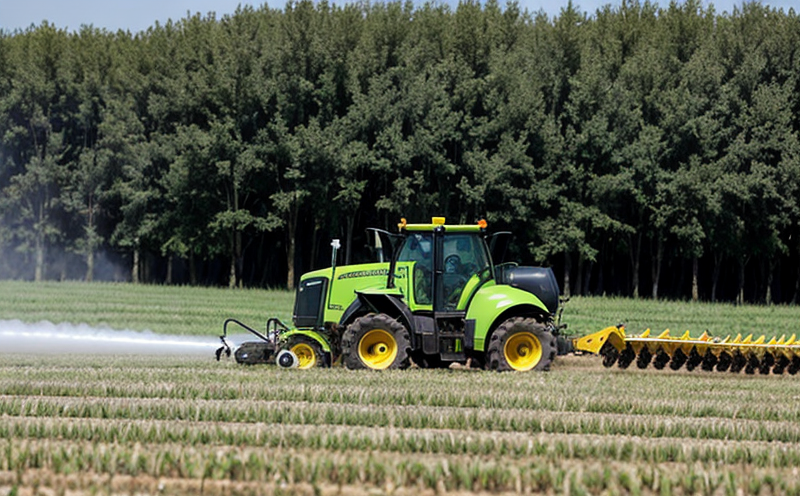Iprodione Residue Testing in Crops
Iprodione Residue Testing in Crops is a critical service provided by our laboratory. This testing ensures that crops, after being treated with the fungicide iprodione, do not contain levels of residue that exceed regulatory limits or pose health risks to consumers and animals.
The herbicide iprodione is widely used in agriculture for its broad-spectrum activity against fungi such as Botrytis cinerea, Rhizoctonia solani, and Fusarium oxysporum. However, excessive residues can lead to adverse effects on human health and the environment. Compliance with international standards like ISO and EU regulations is essential for ensuring food safety.
Our testing process involves several steps. Initially, we receive a sample of the treated crop. The specimen preparation includes thorough cleaning followed by extraction using appropriate solvents. This step ensures that all residues are effectively extracted from the plant material. Once prepared, the samples undergo chromatographic analysis to identify and quantify iprodione.
The analytical methods used for this testing include Liquid Chromatography-Mass Spectrometry (LC-MS/MS), which provides high sensitivity and selectivity. This ensures accurate quantification even at trace levels of residues. The results are reported in parts per million (ppm) or parts per billion (ppb), depending on the regulatory requirements.
Our services go beyond just testing; we also provide expert interpretation of the data, helping our clients understand the implications of their test results. This includes recommendations for safe handling and storage of treated crops to minimize residue levels in final products.
The importance of this service cannot be overstated. Farmers rely on fungicides like iprodione to protect their crops from diseases, but overuse or incorrect application can lead to excessive residues. By providing accurate testing results, we support sustainable agricultural practices and ensure public health protection.
Why Choose This Test
Selecting the right laboratory for iprodione residue testing is crucial for ensuring both compliance with international standards and peace of mind regarding food safety. Our comprehensive service offers several advantages:
- Accurate Quantification: Using advanced LC-MS/MS technology, we can detect even trace amounts of iprodione in crops.
- Regulatory Compliance: We adhere strictly to international standards such as ISO and EU regulations, ensuring that your products meet all necessary requirements.
- Expert Interpretation: Our team provides detailed reports along with insights into the implications of test results.
- Timely Results: We offer quick turnaround times without compromising on accuracy or reliability.
- Customized Solutions: Tailored testing protocols to suit specific crop types and geographical locations.
The combination of precision, expertise, and timeliness makes our services indispensable for quality managers, compliance officers, R&D engineers, and procurement teams in the agriculture sector. By choosing us, you invest in the future of sustainable agricultural practices and consumer trust.
Customer Impact and Satisfaction
The impact of iprodione residue testing extends far beyond mere compliance; it significantly enhances the reputation and sustainability of businesses operating within the agriculture sector. Our clients benefit from:
- Informed Decision-Making: By providing clear, actionable insights into residue levels, we empower stakeholders to make informed decisions regarding crop treatment.
- Enhanced Safety: Ensuring that crops meet stringent safety standards protects both consumers and the environment.
- Competitive Edge: Demonstrating a commitment to quality and sustainability can be a key differentiator in today's competitive market.
- Risk Mitigation: Early detection of potential issues allows for swift corrective actions, minimizing risks associated with non-compliance or reputational damage.
We strive to deliver exceptional service that exceeds expectations. Our clients consistently report high levels of satisfaction and trust in our expertise. By partnering with us, you not only meet regulatory requirements but also contribute to a safer food supply chain.
International Acceptance and Recognition
The acceptance and recognition of iprodione residue testing are crucial for the credibility of laboratories providing such services. Our laboratory is internationally recognized for its rigorous standards and accurate results:
- American Organization for Accreditation (AOAC): We adhere to AOAC international methods, ensuring compatibility with U.S. regulatory requirements.
- Eurofins Global: As part of the Eurofins network, we benefit from global recognition and collaboration with leading laboratories worldwide.
- European Union (EU): Our testing aligns with EU directives on pesticide residues in foodstuffs, ensuring compatibility with European standards.
- ISO/IEC 17025: We are accredited according to ISO/IEC 17025:2017, which guarantees our laboratory's competence and impartiality.
The international acceptance of our results is further enhanced by our participation in proficiency testing programs, such as those offered by the European Co-operation for Accreditation (EA) and International Laboratory Accreditation Cooperation (ILAC).





